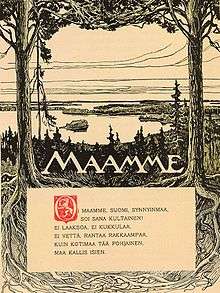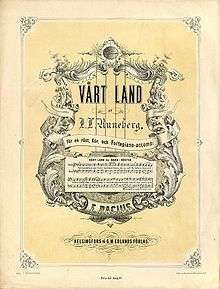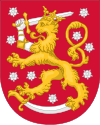Maamme
| English: Our Land | |
|---|---|
 The first stanza of "Maamme" from the Finnish translation of The Tales of Ensign Stål | |
National anthem of | |
| Also known as | "Vårt land" (English: "Our Land") |
| Lyrics | Johan Ludvig Runeberg, 1848 |
| Music | Fredrik Pacius, 1848 |
| Audio sample | |
"Maamme" (instrumental, one verse)
| |
"Maamme" (Finnish: [ˈmɑːmːe]) (Swedish: "Vårt land" Finland Swedish: [ˈvoːrt ˈlɑnːd]; both meaning "Our Land") is Finland's national anthem. The music was composed by the German immigrant Fredrik Pacius, with original Swedish words by Johan Ludvig Runeberg, and with this music it was performed for the first time on 13 May 1848.[1] Originally it was written for the 500th anniversary of Porvoo and for that occasion it was Runeberg himself who wrote the music.[2] The poem was influenced by the "Szózat" (Appeal) of Mihály Vörösmarty, both in style and content.[3]
The melody of "Maamme" is also used for the national anthem of Estonia with a similarly themed text, "Mu isamaa, mu õnn ja rõõm" ("My Fatherland, My Happiness and Joy", 1869).[4] It is also considered to be the ethnic anthem for the Livonians as "Min izāmō" ("My Fatherland").
History

The original poem, written in 1846 but not printed until 1848, had 11 stanzas and formed the prologue to the verse cycle The Tales of Ensign Stål ("Fänrik Ståhls Sägner"), a classic example of Romantic nationalism. The current Finnish language text is usually attributed to the 1889 translation of Ensign Stål by Paavo Cajander, but in fact originates from the 1867 translation by Julius Krohn.[5][6]
The Tales of Ensign Stål were much appreciated throughout all of Scandinavia. Up until the time of Finland's independence in 1917 and 1918, when the song began to be recognized as specifically applying to Finland, Pacius's tune and Runeberg's text were often also sung in Denmark, Norway, and Sweden. Note that in the original Swedish text there is no reference to Finland (except for in verses 4 and 10, which are rarely sung), only to a country in the north, but the Finnish text explicitly refers to Finland. The poem's theme is, furthermore, remarkably similar to that of the national anthems of Sweden ("Du gamla, Du fria") and Norway ("Ja, vi elsker dette landet").
There is no law regarding an official national anthem in Finland, in the way the coat of arms and flag of Finland are legally defined. Instead its position has been established gradually by convention over the years.[4]
Today, "Maamme" is firmly established by convention. Children learn it in school; in formal occasions it is sung both in Finnish and in Swedish. It is played at sporting events, such as the Olympics. In the 1880s and in the 1920s there were more attempts to replace it with a Finnish language version but these ceased by the 1930s.[7] Some Finns have proposed that the Finnish national anthem be changed to "Finlandia" by Jean Sibelius,[8] with lyrics by V.A. Koskenniemi (Finnish) and Joel Rundt (Swedish). There are also those who simply prefer "Finlandia" as a musical piece, although critics claim that it is difficult to sing.
It is said that Pacius composed the tune in four days. It was popular throughout the 19th century, but established as national anthem only after Pacius' death.[9]
The melody of "Maamme" has similarities with the German drinking song "Papst und Sultan". Many believe that Fredrik Pacius intentionally or unintentionally copied parts of the tune.[9] Another Finnish patriotic song, "Sotilaspoika", composed by Pacius, also includes similarities with "Papst und Sultan".
During 1993, an instrumental version of Maamme was used as Finnish professional wrestler Tony Halme's (under the ring name "Ludvig Borga") entrance theme [10]
Lyrics
The original lyrics consist of eleven verses but it is customary to sing the first verse and the last verse, unless the people gathered are mixed Finnish- and Swedish-speaking. In the later case, three verses are sung: the first in Finnish, the first in Swedish and the last in Finnish.
| Swedish original | Finnish translation | English translation |
|---|---|---|
Vårt land, vårt land, vårt fosterland, |
Oi maamme, Suomi, synnyinmaa, |
Our land, our land, our Fatherland! |
International Phonetic Alphabet transcriptions
| Swedish original (key) | Finnish translation (key) |
|---|---|
[vort ˈlɑnd | vort ˈlɑnd | vort ˈfostærlɑnd | ˈjʉːd ˈhøkt | ˈuː ˈdyːrɑ ˈuːrd ‖| ˈej ˈlyfts ˈen ˈhøjd ˈmuːt ˈhimlens ˈrɑnd | ˈej ˈseŋks ˈen ˈdɑːl | ˈej ˈɕøls ˈen ˈstrɑnd | ˈmeːr ˈelskɑd ˈen ˈvoːr ˈbygd ˈiː ˈnuːrd | ˈen ˈvoːrɑ ˈfeːdærs ˈjuːrd ‖] ˈskɑlː ˈmuːgnɑ ˈʉːr ˈsitː ˈtvoŋ ‖| ˈditː ˈjʉːs | ˈdin ˈglɑns | ˈdin ˈfrøjd | ˈditː ˈhopː ‖| ˈok ˈhøːgre ˈkliŋɑ ˈskɑlː ˈen ˈgoŋ |
[ˈo̞j ˈmɑːmːe̞ | ˈs̠uo̞̯mi | ˈs̠ynːyjnˌmɑː | ˈs̠o̞j | ˈs̠ɑnɑ ˈkultɑjne̞n ‖| e̞j ˈlɑːks̠o̞ɑ | e̞j ˈkukːulɑː | e̞j ˈʋe̞t̪ːæ ˈrɑn̪t̪ɑː ˈrɑkːɑːmpɑː | ˈkujn ˈko̞t̪iˌmɑː ˈt̪æː ˈpo̞xjo̞jne̞n | ˈmɑː ˈkɑlːis̠ ˈis̠i.e̞n ‖] ˈʋie̞̯l ˈle̞mpe̞mːe̞ ˈs̠ɑː ˈno̞ws̠e̞mɑːn ˈjɑ ˈke̞rːɑn | ˈlɑwlus̠ ˈs̠ynːyjnˌmɑː ˈko̞rke̞ːmːɑn ˈkɑj.un ˈs̠ɑː ‖] |
See also
- Flag of Finland
- Holidays in Finland
- Finnish national symbols
- "Mu isamaa, mu õnn ja rõõm" – the national anthem of Estonia
- "Ålänningens sång" – the regional anthem of Åland
- "Min izāmō" – the ethnic anthem of the Livonians
References
- "The Finnish national anthem". This Is Finland. Retrieved 2016-05-08.
- Gábor, Richly (2010). "A finn nemzeti himnusz" [The Finnish national anthem]. Kortárs (in Hungarian). 54 (2).
- Leffler Béla. (1918). "A Szózat hatása Runeberg " Vårt land " c. költeményére" (PDF). Irodalomtörténet. 7 (2): 218–221.
- Lassander, Uolevi (1998). "Vårt land - Maamme - Mu isamaa, mu õnn ja rõõm". Tuglas Society (in Finnish). Retrieved 2016-05-08.
- Käännökset (Translations) - Runeberg Museum site (in Finnish)
- J. L. Runeberg Archived 2007-03-15 at the Wayback Machine - Finnish Literature Society site (in Finnish)
- Richly Gábor (2010). "A finn nemzeti himnusz". Kortárs. 54 (2).
- Gronow, Pekka. ""Maamme" (Our country), brief history of the Finnish national anthem". Europeana. Retrieved 2016-05-08.
- Holmqvist, Christian. "The Story of Vårt Land". Pacius 200 years. Retrieved 2016-05-08.
- TheEaglesfan01 (2010-01-26), Ludvig Borga titantron (RIP), retrieved 2019-02-18
- http://www.nykarlebyvyer.nu/sidor/texter/poesi/jlr/vartland.htm
- Runeberg, Johan Ludvig (1919) [1889]. Vänrikki Stoolin tarinat (in Finnish). Translated by Cajander, Paavo.
- "Finland - National Anthem". csridentity.com. Archived from the original on 13 December 2015. Retrieved 3 December 2014.
External links
| Wikisource has original text related to this article: |
- Finland: "Maamme" – Audio of the national anthem of Finland, with information and lyrics
- The Livonian version, sung with organ
- History of the Finnish national anthem
- Full lyrics at Wikisource
- This Is Finland: The Finnish National Anthem – historical overview and RealAudio of the song
- www.national-anthems.net – mp3, RealAudio and Windows Media files of performances
- "Papst und Sultan" – A German drinking-song which resembles the tune of Maamme.
